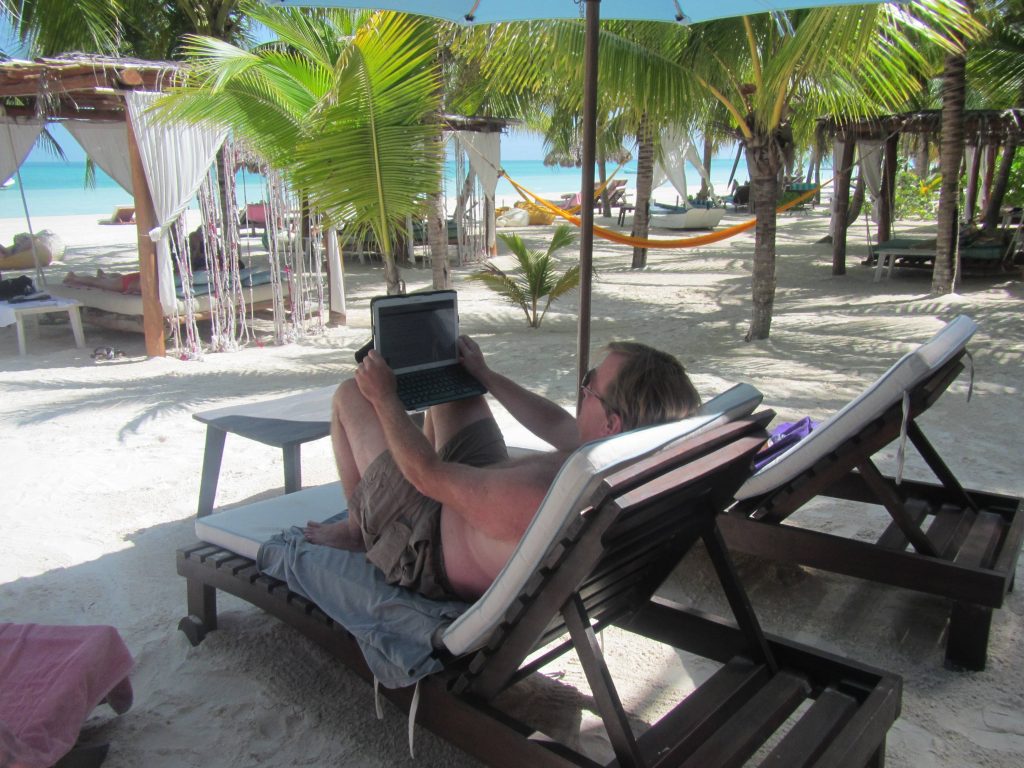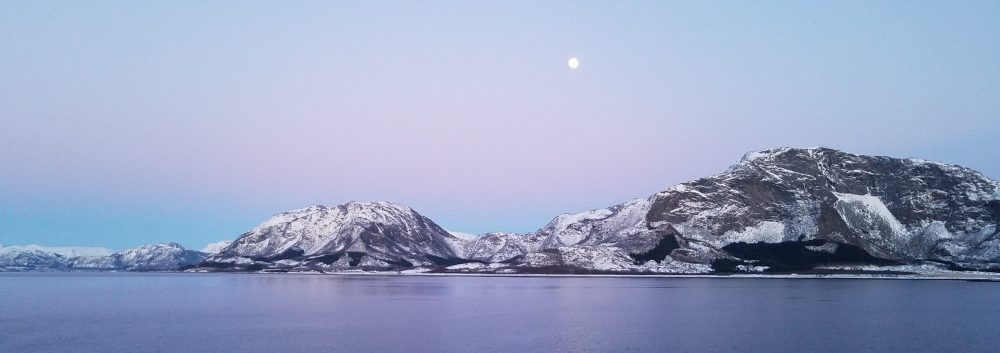Florida’s Amelia Island was about 20 miles behind us when I discovered our rental car displayed the elevation above sea level every 30 seconds or so. Always on the lookout for distractions when driving, and with a furtive glance to my wife who is always looking out for my distracted driving, I engaged the car’s autopilot and undertook a flood plain survey of eastern-central-north Florida.
For the puritanical zeal of a conservation-minded New Englander, it’s a call to arms when, 20 miles from shore, you discover that sea levels need only rise three or four feet and you’re back on shore. Said another way, if global warming stays the course Callahan, FL, is the next Miami Beach, so buy now!
Our destination that day was north-central Alabama, one of a dozen Heartland states attracting urban migrants like magnets even as the same climate change turns the nation’s Breadbasket into a bowling alley and the Sierra’s into the Sahara. For me there’s no greater reward for road-tripping than seeing the country first-hand and I can attest that, despite the climatic headwinds, the Bible Belt is booming.
Is climate change simply an inconvenient truth these migrants pan in pursuit of their own home on the range, mountain or coast? Or are they being swayed by those profiting from the siren’s song of creature comfort that inevitably supplant more idealistic aspirations of youth? The answer might lie in a few other inconvenient truths also being ignored, most notably by those who vote. A. Lot.
I’ve spent the past few years interviewing back-office workers using software to save time doing back-office things. In that time I’ve concluded that upwards of 50 percent of the back-office endeavors of many millions of middle-class workers worldwide simply gets information from Point A to Point B.
These completely unsubstantiated estimates may sound extremist, but then consider secretaries, clerks at every conceivable counter, cashiers, accountants, legal aides, title searchers, and the $16.8 billion medical coding market. The faster these folks do their jobs, the better they do their jobs and that means computers will soon be doing their jobs faster, better and for pennies on the dollar.
Which leads to Inconvenient Truth No. 2. Through a stealthy process called digital transformation, software systems are being built at warp speed to automate these monotonous assignments, with faith in technology the only answer to filling the yawning gap being carved out of our workdays.
Which leads to Inconvenient Truth No. 3: Medical science is advancing so quickly the human life span is expected to expand by 20 percent in a generation or two. The world’s most expensive private healthcare system will go broke overnight covering a nation of nonagenarians while paying CEOs and share-holder dividends.
So, let’s recap. Rising tides and radical weather threatening our countryside and coastlines are being ignored in a rural rush to own a piece of the American Dream. Millions of labor-intensive, creatively-cavernous work assignments are disappearing faster than lawn sprinklers in Arizona. And we work 30 to 40 years so we can take the next 30 to 40 off with little chance of earning enough to cover the health care costs required.
You don’t need to be a meteorologist, computer programmer, or gerontologist to see any one of these inconvenient truths, let alone all three are going will wreak economic ruin world-wide without radical change, and soon. Yet the problems are so complex, the solutions so disruptive, anything other than status quo almost requires a leap of faith in what are nonetheless science-driven realities.
For those putting their faith elsewhere, the one thing that can relieve us our angst over this frightening future is turning our backs on all this technology and doubling down on what gave us such a prosperous past: more fossil fuels and the freedom to do what we want with them. Therein lies the rub.
When Spindletop showed us something akin to dirt could heat our homes and fill our bellies, our capitalist economy became a consumer economy fueled by ever new discoveries of, and uses for, coal, oil and natural gas—ours, and others’. Rather suddenly we no longer needed to hunt-down and hack up whales to light our homes. Petrochemicals made every harvest a bumper crop.
Fossil fuels in all forms became a profit-making machine as we consumed more and more of them, and the products made with them. Lights burned brighter, longer, and for pennies a day as starving Chinese children faded from our collective conscious. Petroleum’s ready conversion into a mind-numbing array of plastics ushered in the age of ending is better than mending.
Waste went from sin to source of national pride when Ronald Reagan tore out Jimmy Carter’s White House solar panels. Today it’s a bone fide religionwhile storing and getting rid of the ever-expanding excesses blossoms into multi-billion dollar industries.
Which brings me to Inconvenient Truth No. 4. Based on Inconvenient Truths 1, 2, and 3: The Consumer Economy must end if our children’s children want to live anything resembling a fulfilling life on a livable planet, and it looks like younger generations are getting the message.
Green shoots of common sense appear to be emerging in the land of shop-til-you-drop most notably for Millennials and their younger colleagues. Thanks may be due to these climatic, technological, and healthcare realities all colliding in the perfect storm of paradigm shifts known as Covid 19.

Lock-downs thwarting the contagion thrust into glaring contrast the career trade-offs we all make in choosing how we spend our limited time on earth. Covid also poured rocket fuel on digital transformation as offices were vacated and internet-accessible homes, mountaintops and tropical beaches put the ol’ 9-to-5 in a whole new perspective.
Between March 2021 and 2022 54 million resignations were submitted, not for better pay so much as better jobs. This employment epiphany is further challenging already wobbly logical linkage between what we to do make money and what we do with the money we make. What better proof of shifting consumer sentiment than advertisements telling us to stop buying more “stuff”?
Who and what is most threatened by a sudden work-ethic shift from spending our lives making and spending the most money possible to simply making the most of our lives however possible: the global fossil fuel industry and its $35 trillion annual stake in the global GDP.
What happens when women will no longer be gamed by glamour? What happens when men discover he who dies with the most toys still dies? What happens when we all stop working for the weekend? Our capitalist-cum-consumer economy inevitably becomes a conservation economy where preservation replaces exploitation as the premium placed on natural resources. Aka: zero waste.
That process starts by using a lot less fossil fuel. Covid kicked that into high gear and it’s anyone’s guess what remote work will ultimately mean for rush hour. Next, the environmental and disposal costs of single-use products—edible, inedible, and/or inflammable—must be added to purchase prices.
People should have the right to work as hard as they want to buy, sell, or waste whatever they want, provided the price the world is paying for their profligacy is taxed in. Right now, fossil fuels and products derived therefrom are steeply discounted at the expense of the long-term health of the planet.
In a conservation economy we won’t be throwing out plastic sporks or water bottles if they cost $1 each. If gas cost $10 a gallon, remote work may very well supplant rush hour, permanently. In a conservation economy, fossil fuel consumption will plummet and me thinks the afore-mentioned petroleum profiteers are doing everything possible to delay this as long as possible, knowing full well they can’t stop it.
How else to explain a near coup-d’état fomented by a luxury-loving POTUS who “digs coal” naming as secretary of state the biggest of Big-Oil big-wigs. Despite the coup, the US appears headed to make this former POTUS King of the country with Job No. 1 being boosting petroleum production vis-a-vis the consumer economy.
Why is Saudi Arabia, the world’s largest oil exporter handing Russia, the world’s second largest oil exporter, a windfall by cutting oil production. (Interesting to note the aforementioned secretary of state is also a Russia Medal of Friendship awardee.) Why is Russia, cozying up to Saudi Arabia’s sworn enemy Iran, which holds the world’ fourth largest oil reserves. Is it possibly the leaders running these countries are reading the writing on the wall?
If these inconvenient truths and COVID-19 have Millennials et. al. casting a jaundice eye on the wastrel ways of fossil-fuel-driven consumer economics, that’s got to scare hell out of the movers, shakers and profit makers greasing the palms of those leaders. Is the world going crazy right now because entrenched fossil fuel interests are fighting tooth-and-nail a seismic shift in the global economy away from the snake oil they’ve sold for the past century?
A little too conspiratorial? Perhaps. From a creature comfort perspective, conversion to conservation economics stacks up poorly against consumerism, particularly for Baby Boomers and Gen Xers who’ve enjoyed a lifetime of beer, BBQ, boating and shopping. In a conservation economy they will need whole new skill sets simply to make it to retirement and these people vote. A. Lot.
Season that inertia with a slathering of faith in country, God, gas, and the good ‘ol days and bingo: a global rise in authoritarian governance going all-in for the status quo, with the consumption capital of the world leading the charge. Yet these Inconvenient Truths leave little doubt the world’s fossil-fuel-driven consumption economics are doomed.
How quickly and how much money can be made in the meantime will be measured by damage done and how long it takes voters to recognize it. A daunting discovery to be sure since the vast majority of those with the most skin in the game, Gens X, Y, Z and Alpha tend to very distracting elemental urges.
Is the Great Resignation a Great Realization among a few of these heirs to our excesses that their parents are making decisions that, with the best of intentions may not be in their best interest? Certainly, some of them appear to be getting the message, but PR stunts are just that. What the younger generations really need to do is vote. A. Lot.

